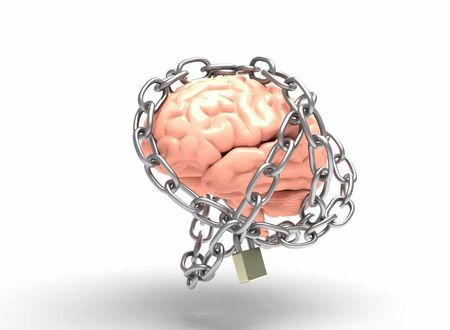Sastang pranam at your lotus feet Swamiji.
‘I am thinking that I am in a low mental phase unable to control myself’. If someone is feeling low and wishing to seek help and utter these words, first thing that family members tell, “don’t be weak, be strong. You have no problems, just bulldoze your imagination.”
Did the above circumstance sound similar to you? Yes, in our society till date, any mental health issue is dealt with like this. In today’s post we will try to find out some reasons why mental health related discussions are very limited or are kept under thick blanket or the discussion itself does not take place.
One may have physical ailment of any kind and people do not hesitate to visit the person to wish ‘get well soon’. But if someone’s mental health is affected and the person is taking professional treatment, people judge and treat the person on a different footing. A clear distinction is often made between ‘mind’ and ‘body’. But mental health and physical health should not be thought of as separate. There are various ways in which poor mental health has been shown to be detrimental to physical health and vice versa.
By not talking about mental health, we add to the stigma that surrounds it Some of the harmful effects of stigma can include
- Discrimination:
The moment people come to know that somebody has a mental health issue, the attitude changes completely. The person loses friends, he or she is looked upon in a totally different perspective. People often associate insanity / lunatic behaviour with mental health issues. As if one turns ‘untouchable’ if he / she is diagnosed with some kind of mental health condition.
- Lack of understanding by family, friends, co-workers or others:
When one expresses about mental health issues, the family members try to downplay the same. It again is a cultural inheritance to which we all are tuned. Accepting mental health problems / issues is treated as ‘you are a weak person and you do not know to manage your emotions’. The first advice which you get is ‘come on, grow up, you can’t be weak on some sort of illusion / imagination’. Believe me, it is very very painful to listen to such type of advice / instruction / command. Yes, these type of words have their value, but not in a commanding manner, rather in an compassionate and encouraging manner after some progress is made in tackling mental health issue being faced. This is my personal opinion. But the family cannot be blamed entirely as they fear social stigma acting against them because the way our society perceives / addresses this sensitive issue. They fear being mistreated by the society.
- Fewer opportunities for work, school or social activities or trouble finding housing:
The society becomes judgmental on the person if he / she accepts mental health problem and sets an imaginary barrier on the achievements of the person. In general, the society has a prejudice in the belief that they’ll never succeed at certain challenges or that they can’t improve their situation. But this assumption does not have a base. In future posts, we will discuss about the myths and facts related to mental health issues. But for now, as the society has put a barrier or drawn a line the avenues for a person even after fully recovering from the mental health condition become very limited. Being said that, I would like to express my gratitude to the society in my vicinity (sphere of interaction) that, I was never discriminated by them during my low phase. I was showered with a lot of love and affection with support.
Sometimes, people with mental health conditions undergo bullying, physical violence or harassment both by the society as well as family members.
- Self-stigma
Self-stigma is another term which refers to the negative attitudes, including internalized shame, that people with mental illness have about their own condition because of which they are unable to open up.
- Institutional stigma
Institutional stigma, is more systemic, involving policies of government and private organizations that intentionally or unintentionally limit opportunities for people with mental illness. Examples include lower funding for mental illness research or fewer mental health services relative to other health care.
These associated stigmas also can lead to a reluctance to seek help or treatment. As per research data, nearly 20% of Americans experience a mental illness in their lifetime. However, fewer than half of those who experience a mental illness seek treatment.
Another study reveals that more than half of people with mental illness don’t receive help for their disorders. Often, people avoid or delay seeking treatment due to concerns about being treated differently or fears of losing their jobs and livelihood. That’s because stigma as described previously, prejudice and discrimination against people with mental illness is still very much a problem.
Stigma, prejudice and discrimination against people with mental illness can be subtle or it can be obvious—but no matter the magnitude, it can lead to harm. People with mental illness are marginalized and discriminated against in various ways, but understanding what that looks like and how to address and eradicate it can help.
The Facts on Stigma, Prejudice and Discrimination
Stigma often comes from lack of understanding or fear. Inaccurate or misleading media representations of mental illness contribute to both those factors. A review of studies on stigma shows that while the public may accept the medical or genetic nature of a mental health disorder and the need for treatment, many people still have a negative view of those with mental illness. Stigma not only directly affects individuals with mental illness but also the loved ones who support them, often including their family members.
Various ethnic groups, races communities and cultures have their own ways of perceiving issues related to mental health. For example, in some Asian cultures, seeking professional help for mental illness may be counter to cultural values of strong family, emotional restraint and avoiding shame. Among some groups, including the African American community’s, distrust of the mental healthcare system can also be a barrier to seeking help.
Media representations of people with mental illness can influence perceptions and stigma, and they have often been negative, inaccurate or violent representations. A study published in April 2020 looked at an example, the popular film Joker (2019), which portrays the lead character as a person with mental illness who becomes extremely violent. The study found that viewing the film “was associated with higher levels of prejudice toward those with mental illness.” Additionally, the authors suggest, “Joker may exacerbate self-stigma for those with a mental illness, leading to delays in help seeking.” Media and movies in general show the aspect of mental illness in a very poor light affecting the public perception.
The stigma of mental illness is universal. A 2016 study on stigma concluded “there is no country, society or culture where people with mental illness have the same societal value as people without mental illness.”
Harmful Effects of Stigma and Discrimination
Stigma and discrimination can contribute to worsening symptoms and reduced likelihood of getting treatment. A recent extensive review of research found that self-stigma leads to negative effects on recovery among people diagnosed with severe mental illnesses. Effects can include:
- reduced hope
- lower self-esteem
- increased psychiatric symptoms
- difficulties with social relationships
- reduced likelihood of staying with treatment
- more difficulties at work
A 2017 study involving more than 200 individuals with mental illness over a period of two years found that greater self-stigma was associated with poorer recovery from mental illness after one and two years.
Stigma in the Workplace
A 2019 national poll from the American Psychiatric Association (APA) found that mental health stigma is still a major challenge in the workplace. About half of workers were concerned about discussing mental health issues at their jobs. More than one in three were concerned about retaliation or being fired if they sought mental health care.
Only about only about one in five workers were completely comfortable talking about mental health issues. The poll found a generational divide: millennials were almost twice as likely as baby boomers to be comfortable (62% vs. 32%) discussing their mental health.
On a more positive note, about half of workers were at least somewhat comfortable talking about mental health and most workers said they would help guide a troubled co-worker to mental health resources. However, even among those willing to help, about one in four workers said they would not know where to turn for mental health help.
I would like to conclude the post by once again re-iterating that “mental illness is treatable, and people with mental illnesses can and do live fulfilling, productive, and happy lives.” But the longer mental health conditions go untreated, the more severe they become.
Take care of yourself. Jai Shri Hari…
Sources and credits
- https://www.psychiatry.org/patients-families/stigma-and discrimination#:~:text=Public%20stigma%20involves%20the%20negative,have%20about%20their%20own%20condition.
- https://ijmhs.biomedcentral.com/articles/10.1186/s13033-021-00502-x
- https://www.bap.org.uk/articles/mental-health-stigma/
- https://www.mentalhealth.org.uk/explore-mental-health/a-z-topics/stigma-and-discrimination
- https://www.healthline.com/health/mental-health/mental-health-stigma-examples
- Mayo Clinic (https://www.mayoclinic.org)









Comments & Discussion
6 COMMENTS
Please login to read members' comments and participate in the discussion.